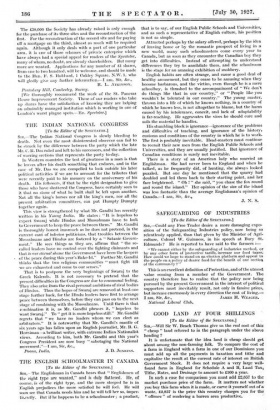THE INDIAN NATIONAL CONGRESS
[To the Editor of the SPECTATOR.] SIR.—The Indian National Congress is slowly bleeding to death. Not even the most disinterested observer can fail to be struck by the difference between the party which the late Mr. C. R. Das ruled and left to his successors, and the collection of warring sections that represents the party to-day.
In Western countries the test of greatness in a man is that he leaves after his death something that endures, and in the ease of Mr. Das we are compelled to look outside his later political activities if we are to account for the tributes that were recently paid to his memory on the anniversary of his death. His followers, if that be the right designation to give those who have shattered the Congress, have certainly seen to it that no stone of what he built shall be left upon another. Not all the king's horses nor all the king's men, nor all the present arbitration committees, can put Humpty Dumpty together again.
This view is strengthened by what Mr. Gandhi has recently written in his Young India. He states : "It is hopeless to expect Swaraj while Hindus and Mussalmans have to look to Government to keep the peace between them." Mr. Gandhi is thoroughly honest inasmuch as he does not pretend, in the current cant of inferior politicians, that troubles between the Mussalmans and Hindus are fostered by a " Satanic Govern- ment." He sees things as they are, affirms that " the so- called leaders have no control over the fighting claimants and that to our eternal shame the Government have been the keepers of the peace during this year's Bakr-Id." Further Mr. Gandhi thinks that the two religious communities " must fight till we are exhausted and come to our senses."
That is to postpone the very beginnings of Swaraj to the Greek Kalends. It is not necessary to pretend that the present difficulties in the Congress are due to communal feeling. They also arise from the rival personal ambitions of rival bodies of Hindus. Thus the hopes of Swaraj are removed at least one stage further back, for the Hindu leaders have first to arrange peace between themselves, before they can pass on to the next stage of combining with the Mussalmans. Until there is that combination it is, as Mr. Gandhi phrases it, " hopeless to want Swaraj." To " get it is more hopeless still." Mr. Gandhi regrets that " we have no leaders whom we can elect as arbitrators." It is noteworthy that Mr. Gandhi's mantle of six years ago has fallen upon an English journalist, Mr. B. G. Horniman—a brilliant writer, with extreme Indian Nationalist views. According to him, both Mr. Gandhi and this year's Congress President are now busy " sabotaging the National movement."—I am, Sir, &c.,


































 Previous page
Previous page